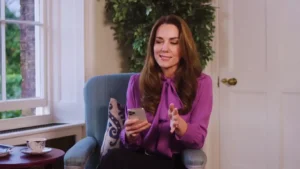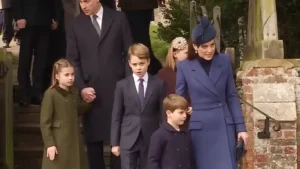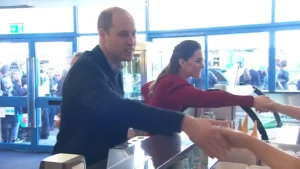
Kate Middleton
Kate Middleton, the Princess of Wales, has recently revealed that she has been diagnosed with cancer. The announcement came after a period of speculation regarding her health, following a “tough couple of months” and recovery from abdominal surgery in January. The Princess has begun a course of preventative chemotherapy treatment.
This news has prompted an outpouring of support from the public and notable figures worldwide, including messages from Boris Johnson and Justin Trudeau. The royal family has requested privacy during this challenging time.
Kate Middleton: public’s reaction

When major announcements are made regarding advancements or breakthroughs in artificial intelligence, the public’s reaction can vary widely depending on the context and significance of the news. One common question that often arises is “Is this AI?” This question reflects a curiosity and perhaps skepticism about whether the technology being discussed truly fits the definition of artificial intelligence, or if it’s simply an advanced form of automation or machine learning.
For example, if a company claims to have developed a chatbot that can convincingly simulate human conversation, people might wonder if it’s truly AI or just a cleverly programmed algorithm. Similarly, if a research team announces a breakthrough in autonomous driving technology, some may question whether the system’s decision-making processes truly qualify as artificial intelligence.
In general, the public’s reaction to announcements about AI tends to be a mix of fascination, excitement, skepticism, and sometimes concern. Many people are intrigued by the possibilities that AI presents, such as improved efficiency, new forms of creativity, and enhanced problem-solving capabilities. However, there are also concerns about the ethical implications of AI, including issues related to privacy, bias, job displacement, and the potential for misuse.
Overall, the question “Is this AI?” reflects a desire to understand the true nature of the technology being discussed and its implications for society. It underscores the need for transparency, clarity, and critical thinking when evaluating claims about artificial intelligence.
Kate Middleton: Public figures like Boris Johnson and Justin Trudeau
Public figures like Boris Johnson and Justin Trudeau have been involved in various activities and have received different levels of support over time. Here’s a brief outline:

Boris Johnson: 
- He has experienced fluctuating levels of approval during his tenure as Prime Minister.
- Boris Johnson resigned as Conservative leader but remained as caretaker Prime Minister until a successor was chosen.
- He has received backing from prominent figures within his party at different times.
Justin Trudeau:
- Trudeau has faced challenges with varying approval ratings and support for his policies.
- Despite being behind in polls, he is still seen as the Liberal Party’s best chance for a historic fourth term.
- Trudeau has announced additional support for Ukraine and has reached an agreement with the New Democratic Party (NDP) to stay in power until 2025.
These outlines are based on their activities and public support as reported up to my last update in 2021, supplemented with recent search results. For the most current and detailed information, it’s best to refer to the latest news and official statements.
The Announcement
Kate Middleton, the Princess of Wales, made a heartfelt announcement about her health, revealing that she has been diagnosed with cancer and is currently undergoing chemotherapy. Here are the key points from her announcement: 
- Diagnosis: Kate Middleton shared that she was diagnosed with cancer following major abdominal surgery that took place in January.
- Treatment: She is now in the early stages of preventative chemotherapy.
- Family Impact: The diagnosis came as a shock, and she, along with Prince William, have been managing this privately for the sake of their young family.
- Public Response: There has been a global outpouring of support for Kate Middleton following her announcement, with warm wishes coming from world leaders, family, and the public.
- Privacy Request: The Princess requested time, space, and privacy while she completes her treatment.
Kate Middleton expressed her gratitude for the support and understanding she has received and emphasized her focus on healing and returning to her duties when able. She also extended her thoughts to others affected by cancer, encouraging them to maintain faith and hope. - Discuss the public’s initial reaction to the news.
Public and Celebrity Support
The support for Kate Middleton from celebrities and public figures has been overwhelming and heartfelt. Here are.
- Olivia Munn: The actress, who has shared her own battle with breast cancer, praised Kate for her grace and determination, offering her best wishes on Instagram.
- Katie Couric: The journalist, who has also been open about her breast cancer diagnosis, liked Kate’s video statement on Instagram, joining millions in support.
- Rishi Sunak: The UK Prime Minister acknowledged Kate’s bravery and emphasized the nation’s love and support for her recovery. He also criticized the recent intense media scrutiny and called for respect for her privacy.
- King Charles: Expressed his support for his “beloved daughter-in-law” and, along with Queen Camilla,
offered love and support to the family during this challenging time. - Prince Harry and Meghan Markle: Sent wishes of health and healing, hoping for privacy and peace for Kate and the family.
- James Middleton: Kate’s brother shared a touching message on Instagram, reflecting on their close bond and the family’s united front in facing Kate’s diagnosis.
- Ivanka Trump: Joined the chorus of voices offering messages of support for the Princess of Wales.
These reactions represent just a fraction of the global support pouring in for Kate Middleton, highlighting the widespread admiration and concern for her well-being.
Section 3: The Role of Social Media
Social media platforms have played a crucial role in sharing support and raising awareness following Kate Middleton’s cancer diagnosis. Here’s an analysis of their impact:
- Sharing Personal Stories: Celebrities like Olivia Munn used social media to share their own experiences with cancer, creating a sense of community and solidarity.
- Public Figures’ Reactions: Leaders like Prime Minister Rishi Sunak took to social media to express their support, which not only spreads the message but also legitimizes the outpouring of public sentiment.
- Viral Trends: The announcement quickly became a trending topic, amplifying the reach of the news and the support for Kate Middleton.
- Combating Misinformation: Social media was used to correct misinformation and conspiracy theories that had spread about Kate Middleton’s health, providing a platform for official statements and factual information.
- Global Reach: The use of social media allowed for a global reaction, with messages of support coming from around the world, demonstrating the borderless nature of digital empathy.
- Real-Time Updates: Social media provided a platform for real-time updates and reactions, allowing the public to stay informed and engaged with the latest developments.
- Emotional Support: The platforms enabled individuals to share emotional support and personal messages, contributing to a collective source of comfort for Kate Middleton and those affected by her diagnosis.
In summary, social media platforms have been instrumental in fostering a global community of support, providing timely information, and combating misinformation, all of which contribute to raising awareness about health issues and the personal challenges faced by public figures.
Privacy and Public Figures
The balance between public interest and the right to privacy for public figures like Kate Middleton is a complex and often debated issue. Here’s an analysis of the key considerations:
Public Interest:
- Transparency: Public figures are often held to a higher standard of transparency due to their influence and the public’s investment in their roles.
- Accountability: Their actions can have wide-reaching implications, making public interest a factor in their accountability.
- Role Models: They serve as role models, and their experiences can drive public discourse and awareness on various issues.
Right to Privacy:
- Human Dignity: Regardless of their status, public figures retain their right to personal dignity and privacy.
- Family Life: They have a right to protect their family life from intrusive media scrutiny.
- Health Matters: Health issues are particularly sensitive, and there is a strong argument for respecting privacy in such matters.
Finding Balance:
- Media Ethics: The media has a responsibility to report with sensitivity and respect for privacy, especially concerning health or personal matters.
- Public Discourse: The public can engage in discourse without encroaching on a public figure’s private life, focusing on their work and public contributions.
- Legal Protections: Laws and regulations can help define the boundaries of privacy for public figures, offering them protection while also considering the public’s right to information.
In the case of Kate Middleton, while her role as a public figure naturally attracts attention, her health diagnosis is a deeply personal matter. The outpouring of support shows the public’s capacity for empathy, while the respect for her privacy underscores the importance of maintaining a humane approach to public interest journalism. It’s a delicate balance that requires ongoing dialogue and ethical consideration.
Conclusion
The overall public response to Kate Middleton’s health announcement has been one of compassion and solidarity. Here’s a summary:
- Empathy: The public has shown deep empathy, recognizing the personal nature of health challenges.
- Support: There has been an immense outpouring of support from individuals, celebrities, and public figures, highlighting the importance of community during tough times.
- Respect for Privacy: Many have voiced the need to respect Kate’s privacy, balancing public interest with personal boundaries.
- Global Unity: The reaction has transcended borders, showing that support during personal challenges is a universal sentiment.
The widespread support underscores the significance of collective empathy and the positive impact it can have on those facing personal health challenges. It serves as a reminder of the strength found in community and the shared human experience.
